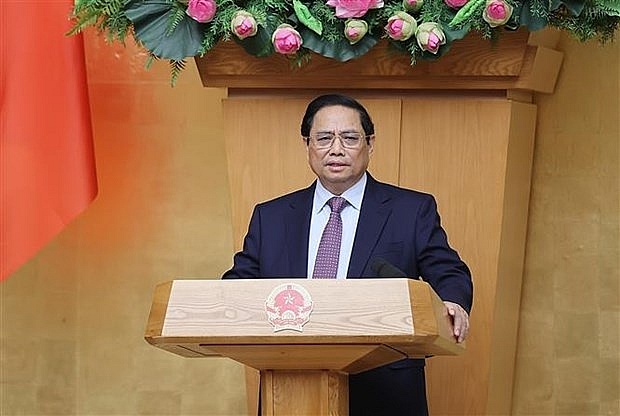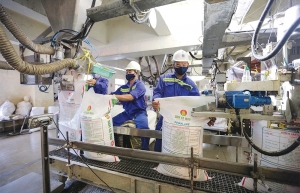Current VAT rate may remain for foreseeable future
 |
| Current VAT rate may remain for foreseeable future, illustration photo/ Source: VNA |
Prime Minister Pham Minh Chinh last week tasked the Ministry of Finance to conduct a comprehensive review of the government’s policies on extending and reducing a number of taxes and fees for enterprises and the public, and to propose a new similar initiative for the second half of 2024.
Before April 30, results must be submitted to the government, which will consider and report to the 15th National Assembly’s (NA) seventh session, slated for May and June this year. The NA will make a final decision.
The taxes to be reviewed and extended in payment include VAT currently applied at 8 per cent, corporate income tax (CIT), personal income tax, and special consumption tax for domestically produced automobiles.
The fees to be reviewed and reduced consist of registration fees for domestically produced and domestically assembled automobiles, and reduction of rental for land and water surface.
“It is necessary to consider and promulgate policies on reducing taxes, fees, and charges as we did in 2023 to remove difficulties and support production and business activities,” PM Chinh said.
Mac Quoc Anh, vice chairman and general secretary of the Hanoi Association of Small and Medium-sized Enterprises, last week suggested that there needed to be continued extension and reduction of VAT, CIT, and import tariffs. Besides that, land rent needs to be cut by half in 2024 and for the first six months of 2025.
“Enterprises are facing difficulties and need more support,” Anh said. “Under a recent survey by the association, businesses are suffering from many challenges, such as a lack of orders (52 per cent), difficulty in access to capital (32 per cent), and cumbersome administrative procedures (25 per cent).”
Nguyen Quoc Viet, deputy general director of the Vietnam Institute for Economics and Policy Research, commented that as enterprises remained bogged down in difficulties, it was necessary to continue policies on exempting, extending, and reducing taxes.
“To help recover domestic demand for goods and services, the policy of keeping the 8 per cent VAT rate needs to be prolonged until the year’s end,” Viet said. “What is more, it is necessary to continue reforming the VAT refund policy so that enterprises can be supported more in reducing compliance costs.”
Vu Tien Loc, a NA deputy representing Hanoi, added that amid ongoing difficulties, if the existing policy on a VAT was extended until the end of this year, with a wider range of goods and services, there will be bigger positive impacts on businesses and the public, helping to push up domestic consumption and boost economic growth this year and beyond.
In November last year, the NA for the third time kept the VAT rate at 8 per cent on goods and services that previously had a 10 per cent rate, in order to “contribute to reducing prices of goods and services to promote production and business” and generating more employment.
The existing 8 per cent VAT rate, valid to June 20, will not apply to telecommunications, IT, financial activities, banking activities, securities, insurance, trading of real estate, metals, precast metal products, mining products (excluding coal mining), coke mining, refined oil, chemical products, and also goods and services that are subject to excise taxes.
The VAT cut since 2022, together with other solutions on fee and tax support, have helped significantly save production costs and increased profits, while enabling consumption in the domestic market. The government reported that the VAT level from July to October 2023 helped provide financial support worth $650 million, contributing to decreasing the price of services and goods, and helping to boost production, business, and employment.
Since 2020, the total value of all solutions on exemption, reduction, and extension of taxes, fees, and land rental reached $29.16 billion.
 | VAT overhaul to boost agriculture prospects Vietnam is set to revise its existing Law on Value-Added Tax with a reclassification of products in areas like agriculture and fisheries, with the hopes of making them more favourable in performance. |
What the stars mean:
★ Poor ★ ★ Promising ★★★ Good ★★★★ Very good ★★★★★ Exceptional
 Tag:
Tag:
Related Contents
Latest News
More News
- Cashless payments hit 28 times GDP in 2025 (February 04, 2026 | 18:09)
- SSIAM and DBJ launch Japan Vietnam Capital Fund (February 04, 2026 | 15:57)
- Banks target stronger profits, credit growth in 2026 (February 04, 2026 | 15:43)
- Vietnam on path to investment-grade rating (February 03, 2026 | 13:07)
- Consumer finance sector posts sharp profit growth (February 03, 2026 | 13:05)
- Insurance market building the next chapter of protection (February 02, 2026 | 11:16)
- NAB Innovation Centre underscores Vietnam’s appeal for tech investment (January 30, 2026 | 11:16)
- Vietnam strengthens public debt management with World Bank and IMF (January 30, 2026 | 11:00)
- Corporate bond market poised for stronger growth cycle (January 28, 2026 | 17:13)
- Vietnam's IPO market on recovery trajectory (January 28, 2026 | 17:04)




















 Mobile Version
Mobile Version